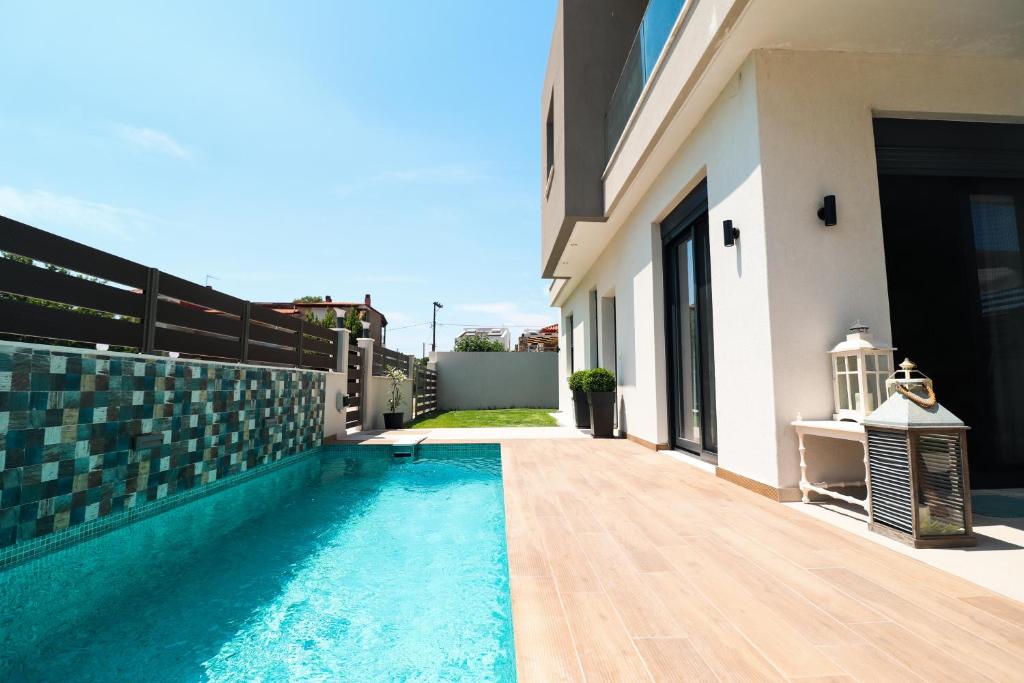As a homeowner with a pool, you may have heard about bromine but wondered, ‘what is bromine in a pool’? Understanding its importance can help you make informed decisions about maintaining your pool in a safe and efficient manner.
In this comprehensive guide, we will delve into what bromine is, its advantages, how it works in pool maintenance, and how you can utilize it to keep your pool clean and healthy.

1. Introduction to Bromine
Bromine is a chemical element that is used as an alternative to chlorine for disinfecting pools and spas. This halogen element, symbolized by ‘Br’ on the periodic table, belongs to the same group as chlorine and has similar disinfecting properties.
1.1 Why Use Bromine?
Bromine is preferred by many pool owners for several reasons. Unlike chlorine, bromine remains effective even at higher temperatures and pH levels, making it ideal for both indoor and outdoor pools.

2. The Chemistry Behind Bromine
Understanding the chemistry of bromine will help you appreciate its role in maintaining pool hygiene. Bromine works primarily as a sanitizer and oxidizer, breaking down harmful contaminants and preventing bacteria and algae growth.
2.1 Bromine vs. Chlorine: A Comparative Analysis
While both bromine and chlorine serve similar purposes, bromine offers some significant advantages, such as being less irritating to the eyes and skin and maintaining its effectiveness in a broader range of pH levels.

3. How Bromine Works in Pool Water
When bromine is added to pool water, it forms bromamines, which are compounds that actively sanitize the water. Unlike chloramines, which can cause a strong chlorine smell and irritation, bromamines are less likely to cause discomfort.
3.1 The Bromine Cycle
The bromine cycle begins when bromine is introduced into the water. It reacts with contaminants to form bromamines, which then break down further to regenerate bromine, continuing the cycle of sanitation.
4. The Benefits of Using Bromine
One of the main benefits of using bromine is its effectiveness at higher temperatures, making it ideal for spas and heated pools. Additionally, bromine is gentler on the skin and eyes, providing a more comfortable swimming experience.
4.1 Longer-lasting Effectiveness
Bromine has a longer lifespan in pool water compared to chlorine, meaning less frequent applications and lower overall maintenance.
5. How to Add Bromine to Your Pool
Adding bromine to your pool is a straightforward process. You can use bromine tablets, granules, or liquid bromine, which can be added directly to the water or through a brominator.
5.1 Steps for Adding Bromine
First, test your pool water to determine the current bromine level. Then, add the appropriate amount of bromine based on your pool’s volume, and use a brominator to maintain a consistent level.
6. Maintaining Bromine Levels
Regular monitoring and maintenance of bromine levels are crucial to ensure your pool remains clean and safe for swimmers. Use a reliable test kit to check the bromine levels and make adjustments as needed.
6.1 Tips for Effective Bromine Maintenance
Test your pool water at least once a week, and adjust the bromine levels as necessary. Keep your pool’s pH levels balanced to maximize bromine efficiency.
7. Bromine Safety and Handling
While bromine is generally safe to use, it is essential to handle it with care. Wear protective gloves and eyewear when adding bromine to your pool to avoid irritation or injury.
7.1 Storing Bromine Safely
Store bromine products in a cool, dry place away from direct sunlight and out of reach of children and pets.
8. Common Issues with Bromine
Despite its benefits, there can be some common issues associated with bromine use, such as bromine demand and cloudy water. Identifying and addressing these issues promptly will help maintain a clean pool.
8.1 Troubleshooting Bromine Problems
If you experience high bromine demand, it could be due to excessive contaminants. Consider shocking your pool to address this issue and restore the bromine level.
9. Cost Considerations
Bromine tends to be more expensive than chlorine. However, its long-lasting effectiveness can offset the initial investment, resulting in cost savings over time.
9.1 Evaluating Cost vs. Benefits
Compare the cost of bromine with its benefits to determine if it is the right choice for your pool. The enhanced comfort and reduced maintenance may justify the higher price.
10. Bromine in Hot Tubs
Hot tubs often use bromine due to its ability to remain effective in warm water environments. This makes it an excellent sanitizer for hot tubs, providing a safe and enjoyable soaking experience.
10.1 Benefits for Hot Tubs
Bromine’s stability at high temperatures and gentle effect on skin make it an ideal choice for hot tubs, ensuring a pleasant and clean experience for users.
11. Bromine and Pool Covers
Using a pool cover can help maintain bromine levels by reducing the amount of contaminants entering the pool and minimizing evaporation.
11.1 Choosing the Right Pool Cover
Select a high-quality pool cover to maximize bromine efficiency and extend the lifespan of your pool water’s cleanliness.
12. Environmental Impact
Bromine is generally considered to be more environmentally friendly than chlorine. It breaks down more quickly and leaves fewer harmful byproducts in the water.
12.1 Sustainability Practices
Adopt sustainable practices, such as proper disposal of bromine products and minimizing pool water waste, to reduce the environmental impact of pool maintenance.
13. Alternative Pool Sanitizers
While bromine and chlorine are the most common pool sanitizers, other options such as ozone and UV systems can also be effective. Consider these alternatives if you have specific concerns or requirements for your pool.
13.1 Comparing Alternatives
Each pool sanitizer has its pros and cons. Evaluate them based on effectiveness, cost, and maintenance requirements to decide which is best for your pool.
14. Frequently Asked Questions
14.1 What are the ideal bromine levels for a pool?
The ideal bromine level for a pool ranges from 3 to 5 ppm (parts per million). Maintaining this range ensures optimal sanitation and safety.
14.2 Can bromine and chlorine be used together?
It is generally not recommended to use bromine and chlorine together, as they can react and form unwanted compounds. Stick to one sanitizer for the best results.
14.3 Is bromine safe for swimmers?
Yes, bromine is safe for swimmers when used correctly. It is less likely to cause skin and eye irritation compared to chlorine, making it a preferred choice for many pool owners.
As an Amazon Associate, I earn from qualifying purchases.
For more tips on maintaining your home, check out our other articles onHome Repairs and Nonprofit Organizations.
As an Amazon Associate, I earn from qualifying purchases.

